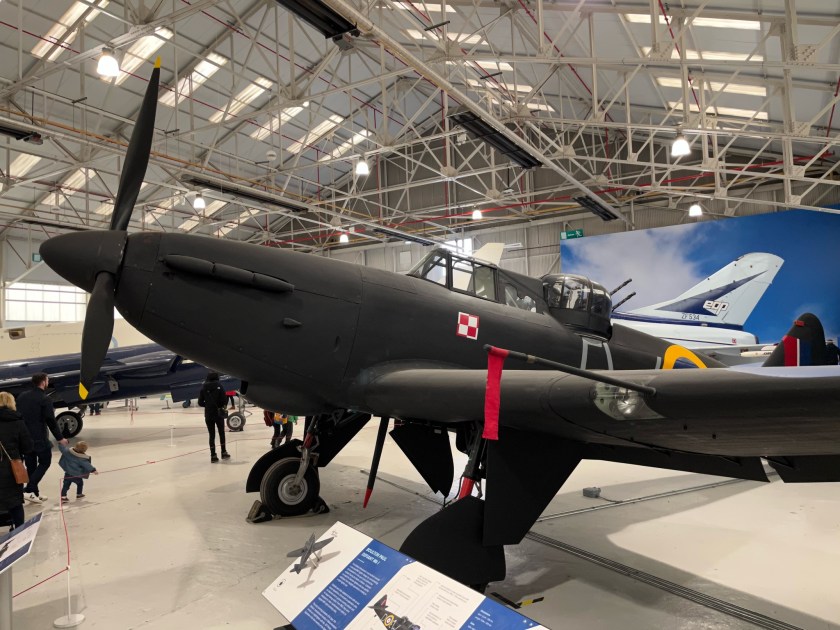This Boulton Paul Defiant was on display at RAF Cosford.
The Boulton Paul Defiant was a British two-seat turret fighter aircraft that served with the Royal Air Force (RAF) during the Second World War. The Defiant was designed and built by Boulton Paul Aircraft as a “turret fighter”, without any fixed forward-firing guns, a design also found in the Blackburn Roc of the Royal Navy.
During 1935, the concept of a turret-armed defensive fighter to counter the bomber threat emerged during a time in which the RAF anticipated having to defend Great Britain against massed formations of unescorted enemy bombers. The RAF did not expect bombers to be escorted by fighters because fighters would not have the range to reach the UK from Germany. In theory, turret-armed fighters would approach an enemy bomber from below or from the side and coordinate their fire. The separation of the tasks of flying the aircraft and firing the guns would allow the pilot to concentrate on putting the fighter into the best position for the gunner to engage the enemy. However, manually-traversed turrets were viewed as having becoming more problematic and increasingly inadequate to effectively respond to ever-faster hostile aircraft, thus there was considerable interest in using a power-augmented turret.
The Defiant entered service in December 1939, and initially achieved some success during the Battle of Britain, shooting down 65 German aircraft. However, its lack of forward-firing guns made it vulnerable to attacks from the front, and it was soon withdrawn from front-line service. The Defiant was later used as a night fighter, and also for air-sea rescue and target towing.
In mid-1942 it was replaced by better performing night-fighters, the Bristol Beaufighter and de Havilland Mosquito.
The Defiant was powered by a single Rolls-Royce Merlin engine, and had a maximum speed of 489 km/h. It was armed with four .303 Browning machine guns in a rear-facing turret. The Defiant had a crew of two: the pilot and the rear gunner.
The Defiant was a capable aircraft, but it was ultimately limited by its design. Its lack of forward-firing guns made it vulnerable to attacks from the front, and it was also relatively slow and had a limited range. Despite these limitations, the Defiant played an important role in the Battle of Britain, and it continued to serve with the RAF until the end of the war.
A total of 1,033 Defiants were built, and the type was retired from RAF service in 1945. They were used to test ejection seats before being retired.
On a previous visit the Boulton Paul Defiant was being assembled.



